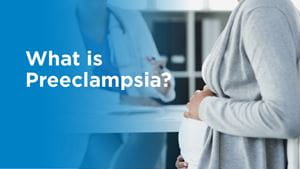
Preeclampsia, sometimes known as toxemia, is a disorder that can occur in pregnant women. Usually showing symptoms late in pregnancy, preeclampsia can lead to eclampsia, which is a dangerous condition that can have serious health risks for the mother and baby and in rare cases, may cause death.
“Understanding the symptoms of preeclampsia and attending regular visits to your doctor for prenatal care can help protect you and your baby,” said Megan Carmel, MD, OBGYN.
What are the symptoms of preeclampsia?
Pregnant women with preeclampsia can experience a rise in blood pressure, weight gain of 2 pounds or more a week, protein in the urine, and swelling in the feet, face, eyes, or hands. Preeclampsia can also cause:
If you notice any of these symptoms while pregnant, call your health care provider immediately.
“If preeclampsia is not treated, both the mother and baby are at higher risk of illness. The mother is more likely to experience serious illness and seizures, and the baby is at higher risk of growth issues due to lack of oxygen and food,” said Dr. Carmel.
Currently, the exact cause of preeclampsia is unknown. While it occurs at conception, the symptoms generally do not show before 20 weeks of pregnancy.
Women can reduce their potential symptoms of preeclampsia by avoiding smoking entirely. Pregnant women should also eat well-balanced meals that incorporate high-protein foods, like lean meats, fish, eggs, peanut butter, milk, and dried beans.
“It’s important that pregnant women do not skip any appointments with their health care provider. Some women may have preeclampsia with no clear symptoms, but regular blood pressure screenings at the doctor can detect it.”
Meet our prenatal care team
What are the risk factors for developing preeclampsia?
Certain factors and health conditions can increase the risk of developing preeclampsia, including:
The only cure for preeclampsia or eclampsia is giving birth. Your health care provider will help you to determine the best time for delivery, depending on how far along your baby is, how healthy they are in the womb, and the severity of the preeclampsia.
If your baby is healthy and far along in development, usually 37 weeks into pregnancy or more, your doctor may recommend inducing labor or proceeding with a cesarean section to prevent preeclampsia from worsening.
If your baby is not close to term, your doctor may closely watch for worsening pre-eclampsia until your baby is far along enough in development to be delivered safely. The closer your baby is to the due date, the healthier and safer delivery is for the baby.
For those with preeclampsia who are being monitored, a doctor may recommend:
“For pregnant women, close monitoring of symptoms and regular visits to a health care provider will help ensure safety and health during pregnancy, labor, and delivery,” said Dr. Carmel.